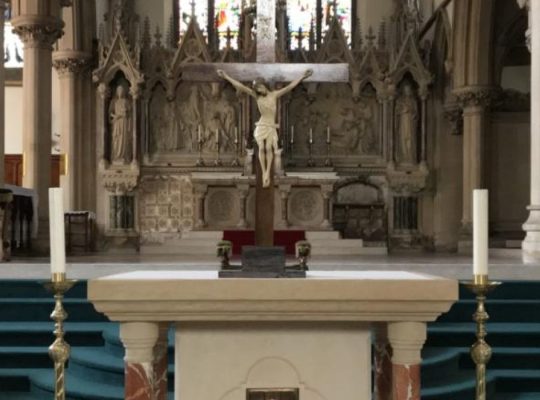The first reading this Sunday recalls how “Naaman, the army commander of the king of Aram…a leper,”was healed by Elisha. In fact, this is only one part of the story found in the Second Book of Kings, in the section sometimes called “the cycle of Elisha.”
What the lectionary wants to convey today comes through this very sober story by itself. It is possible to grasp the meaning of it in the Liturgy of the Word without having to refer to what comes before or after the healing. However, one must be attentive to some of the details of the text to perceive its full meaning.
First of all—and of crucial importance— Naaman is a pagan, and even more, an Aramean general who is probably hostile to Israel itself! He is struck with leprosy, that terrible sickness, thought to be very contagious and a divine punishment—a malediction. Indeed, he is not said to be “healed” but “cleansed.” His affliction was in some way, at least for the writer of the story, related to a sickness that was not more than physical.
If Naaman “went down and plunged himself into the Jordan seven times,” it was to obey the order of the prophet who had told him, “Go and do this.” Why would Elisha command him to do this? One would have thought that he would perform the healing personally, either by laying his hands on the sick man while invoking God or by pronouncing a miraculously efficacious word such as Peter said to the invalid at the “Beautiful Gate” of the temple. “In the name of Jesus Christ, the Nazarene [risen] walk!” That Naaman would have been disturbed — indeed shocked—by this is understandable. Did Elisha want to test the pagan? Did he regard this as a convenient opportunity to prove that there was a prophet in Israel, rebuking a lack of faith among the people by intervening publicly on behalf of a general of the Aramean army? Like Jonah, who after having preached at Nineveh, sat in the shade “to see what would happen to the city,” did Elisha want to see what this man would do, whom he had sent away with such a strange order?
Whatever the case may be, Naaman finally obeyed and was “cleansed.” But he had another surprise for the prophet, for “he returned with his whole retinue to the man of God.” The first thing he said could only delight the prophet. What a marvellous and sudden conversion! “Behold I know there is no God in all the earth, but in Israel.” What he adds provokes a strong reaction from Elisha: “Please accept a gift from your servant.” This gift was traditional. And yet the prophet emphatically refuses: “As the Lord lives whom I serve, I will not take it.” Did Elisha have some doubt about the meaning of Naaman’s offer and thus the purity of his faith? Did he want him to understand that his avowal of belief must go directly to God, without being mediated by a “man of God”? In any case, the prophet’s disinterestedness attests to the complete gratuity of healing: “One does not thus pay the God of Israel; one receives his gifts in thanksgiving.” Instead, the prophet accedes to Naaman’s desire to cart away some of the earth of Israel to build an altar to the Lord, for he no longer wishes to “offer holocaust or sacrifice to any other god.” This is a significant mark of the good intentions of this Syrian. If it seems somewhat surprising to us, it is because we have learned that God is not tied to one people, one land, one temple, nor the liturgy to one language. How can this not be a cause for thanksgiving? “The Lord has shown his salvation to the nations.”
We now turn to the Gospel. To remember Jesus Christ, is to return constantly to the “memoirs of the apostles,” to what they wrote in order that we might give a good account of the truth of the teaching we have received. (Luke 1:4) Since the Thirteenth Sunday, we have followed Jesus on his “journey to Jerusalem.” As we have already noted, it is more of a theological than a geographical road. In fact, we have hardly moved spatially; but what a wealth of teaching has been given to us.
We are still in the confines of Galilee and Samaria in the Gospel this Sunday, the region where Jesus lived, where the Jews were so little orthodox that they were regarded as heretics, in some ways worse than the Gentiles. It is in this area of ill repute that Luke situates one of the best known episodes of his Gospel.
When Jesus is about to enter a village, ten lepers come to meet him. They keep their distance, in accordance with the laws. But what they say is extraordinary: “Jesus, Master, have mercy on us!” More than a piteous petition, this is an unexpected profession of faith. “Jesus!”— It is rather uncommon in the Gospels for someone to call Jesus simply by his name. Only three times does it happen, and in each case, it is the beginning of an entreaty. The blind man at Jericho says: “Lord, Son of David, have pity on us” (Matt 20:31; Luke 18:38) The other two instances are found only in Luke, here and in the account of the Passion, where one of the thieves says: “Jesus, remember me when you come into your kingdom.” (Luke 23:42) The connection of this last, with that of the lepers is noteworthy. They both come from sinners: a man hanging from a gibbet for his crimes, ten men struck with a sickness that was supposed to be associated with sin. Jesus’ response to the thief and what he says to the Samaritan cured of his leprosy clearly indicates that prayer leads to salvation and opens the way to the kingdom: “Today, you will be with me in paradise.”(Luke 23:43); “Your faith has saved you.” (Luke 17:19)
Thereafter, the invocation of Jesus’ name becomes more common. “Master” also has a very strong connotation. Luke is the only one to use this title as a confession of Jesus’ omnipotence: Peter before the miraculous catch (Luke 5:5) and on the mountain of the transfiguration (Luke 9:33); the apostles begging for help in the midst of a storm (Luke 8:24) John expressing astonishment at having seen demons driven out at the name of Jesus by someone who does not belong to the Twelve. (Luke 9:49)
What richness of faith there is in these simple words! The lepers have nothing else to say. Jesus’ response is brief: “Go show yourselves to the priests.” This is sufficient for the ten who take to the road immediately to make the journey, marking a new way of expressing their faith.
Unlike Naaman, they show no disappointment at not seeing Jesus lay his hands on them to heal them directly. They rely purely and simply on his word. Why would he tell them to show themselves to the priests unless their healing would be thus verified? Therefore, it must already be given, even if they do not see it yet. And indeed, “as they were going, they were cleansed.” One thought cannot help but come to mind: It is doing what Jesus commands that one obtains one’s request: “I say to you rise”; “Go”; “Blest are those who hear the word of God and observe it.”
At this point, the plot thickens. “One of them, realizing he had been healed, returned, glorifying God in a loud voice; and he fell at the feet of Jesus and thanked him. He was a Samaritan.”
Even if this were only a recognition of a received blessing, it would merit being singled out and set up as an example for the Christian community. But there is more involved. Glorifying God, falling at Jesus’ feet (prostrating oneself), speaking his praises, are all expressions that might fairly be called technical. They refer to liturgical attitudes, cultic behaviour. Indeed, “Rise” (Stand up) above all associated with ‘Your faith has saved you,” is more than a mere invitation not to remain lying face down on the ground; it is reminiscent of being raised from the dead, which evokes the passage from death (sin) to the life that comes from baptism. “Rise up” often signifies resurrection, whether that of Christ himself or those whom God saves.
“Go on your way” also has a very strong meaning. In the context of the “journey” to Jerusalem after what has been said about the necessity for the disciple, of following Jesus wherever he goes, and bearing one’s cross, there is certainly more involved here than a simple leave taking. We note, furthermore, the abundance of verbs and terms of movement in this passage. Jesus “journeys” to Jerusalem, he “enters” a village. Ten lepers “meet” him he tells them to “go” and show themselves to the priests. They are cured “on their way.” One of them “returns,” “falls,” “stands up,” and finally” goes.”
This suggests that through the story, remarkably composed and structured, the evangelist wants to teach us that the encounter with Jesus overthrows not only the particular state but the ongoing life of every sinner [leper]. This encounter is a “passage” a Passover in faith. In fact, it is faith that is at issue here—its gratuity, the salvation it grants that is offered to all, even to a Samaritan in the course of Jesus’ ministry— to the Gentiles following Pentecost. Remember that the first “mission” took place in a town in Samaria. Phillip proclaimed Christ to the people and brought them the joy of the good news. The apostles in Jerusalem learned of it, Peter and John were sent to them, “Who went down and prayed for them, that they might receive the Holy Spirit” through the laying on of hands.
Note also, how often in his two Books — Gospel and Acts— Luke insists on the universalism of salvation, and how often he points out that Jesus himself announced the good news, if not in pagan lands, at least in areas with mixed populations, like Samaria, and that non-Jews also benefited by his miracles. In this, he sees the preparation for and justification of the universal mission. The Book of Acts ends with a declaration of Paul that expresses Luke’s thought: “Let it be known to you that this salvation of God has been sent to the Gentiles; they will listen.” This admonition still echoes in the Church today as a warning to the Churches.
Whoever has faith lives by faith and obtains salvation. It is an absolutely gratuitous gift. What is done in obedience can claim a right to no other wage. The recompense itself is a gratuitous gift of the love of God that is indeed hoped for but not demanded. There is nothing servile in our service of the Lord, nor any mercenary calculation in our efforts.
We are disciples of the one who has given all for us, even his own life, and received all from the Father who has resurrected and glorified him. “Remember that Jesus Christ was raised from the dead.” Our hope and our joy rest on the faithfulness of God, our Rock. He cannot deceive us. His promises will be fulfilled “at the chosen time.” Neither in God or his messenger, is there the least discrimination: they distribute their gifts to all who have faith. Even a Samaritan has recognized Jesus as the Lord, has been able “to give thanks,” to share in “Eucharist.” The gift that we have received must constantly be awakened in ourselves and transmitted faithfully to others. For as Saint Paul tells us:
“Here is a saying that is trustworthy: If we have died with him, then we shall also live with him. If we endure, then we will also reign with him.”


